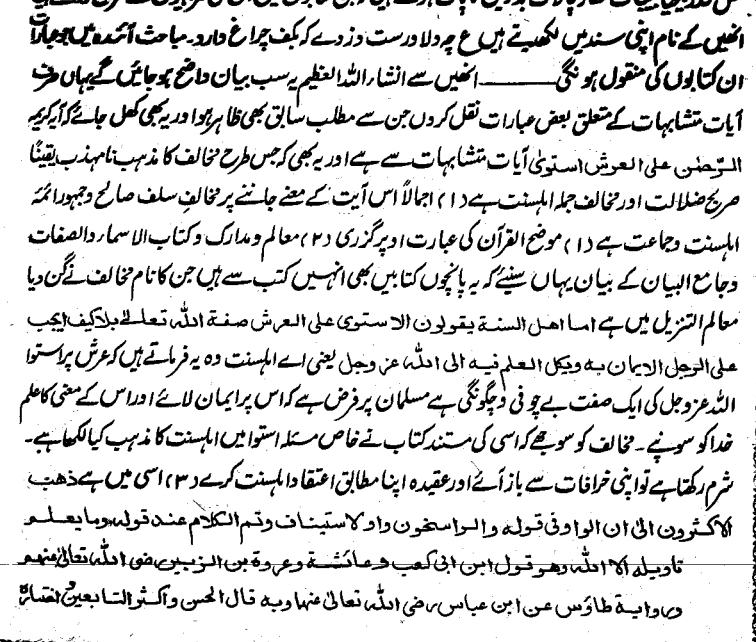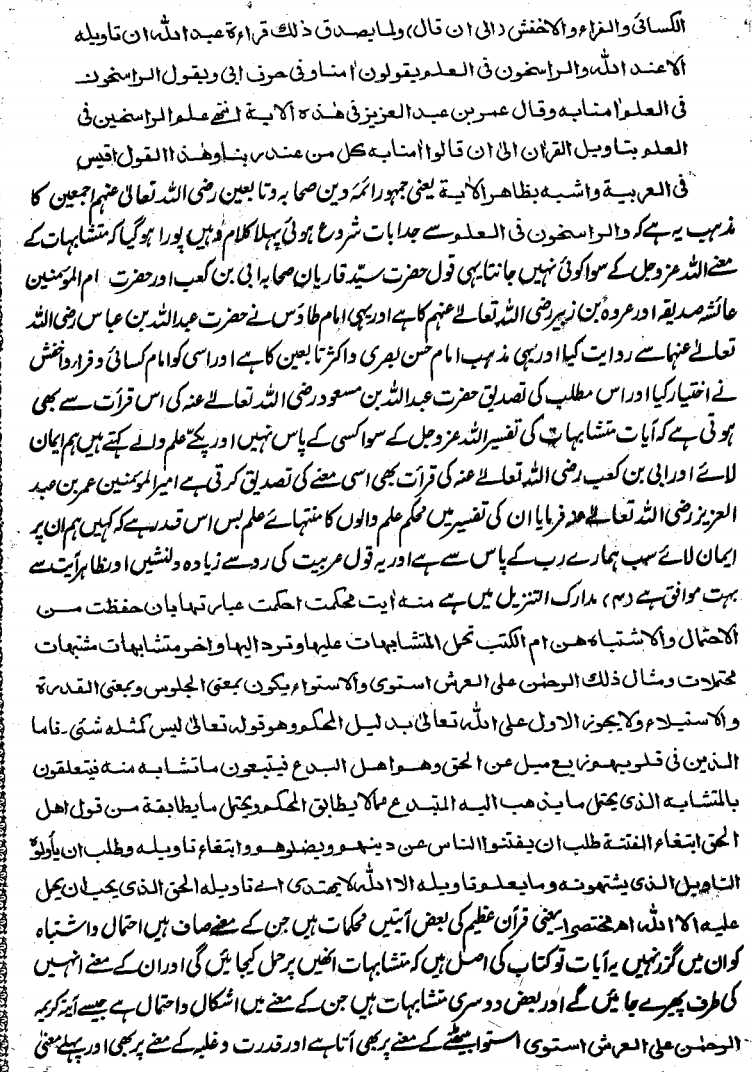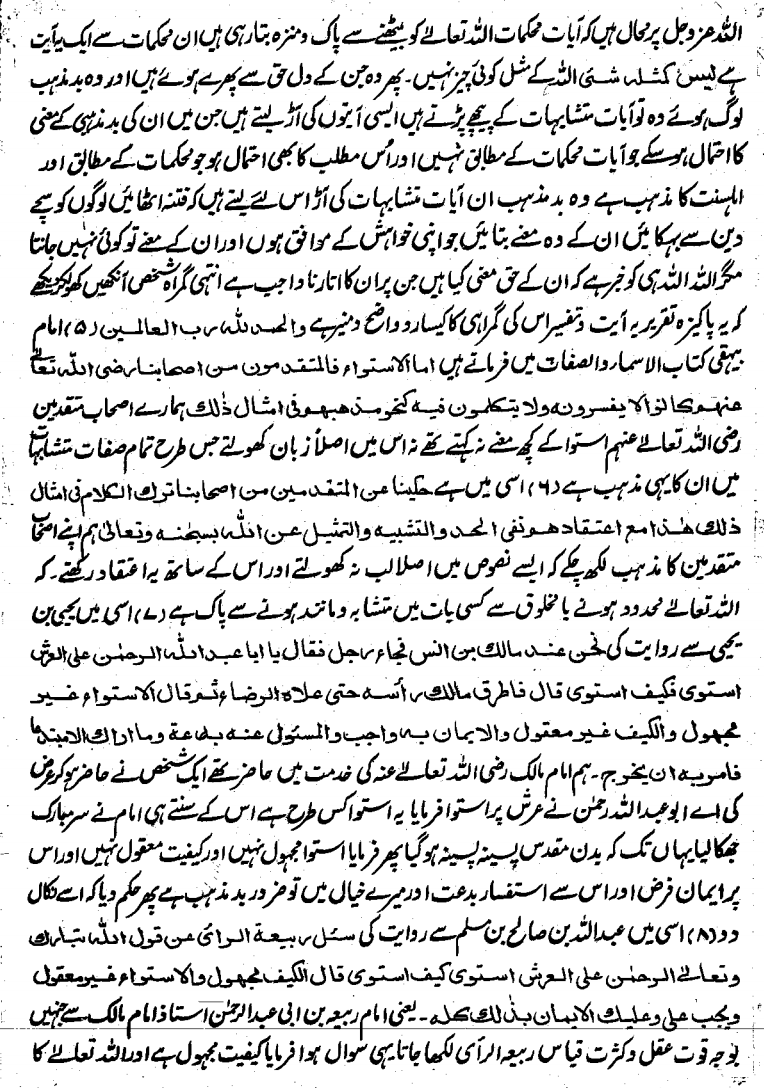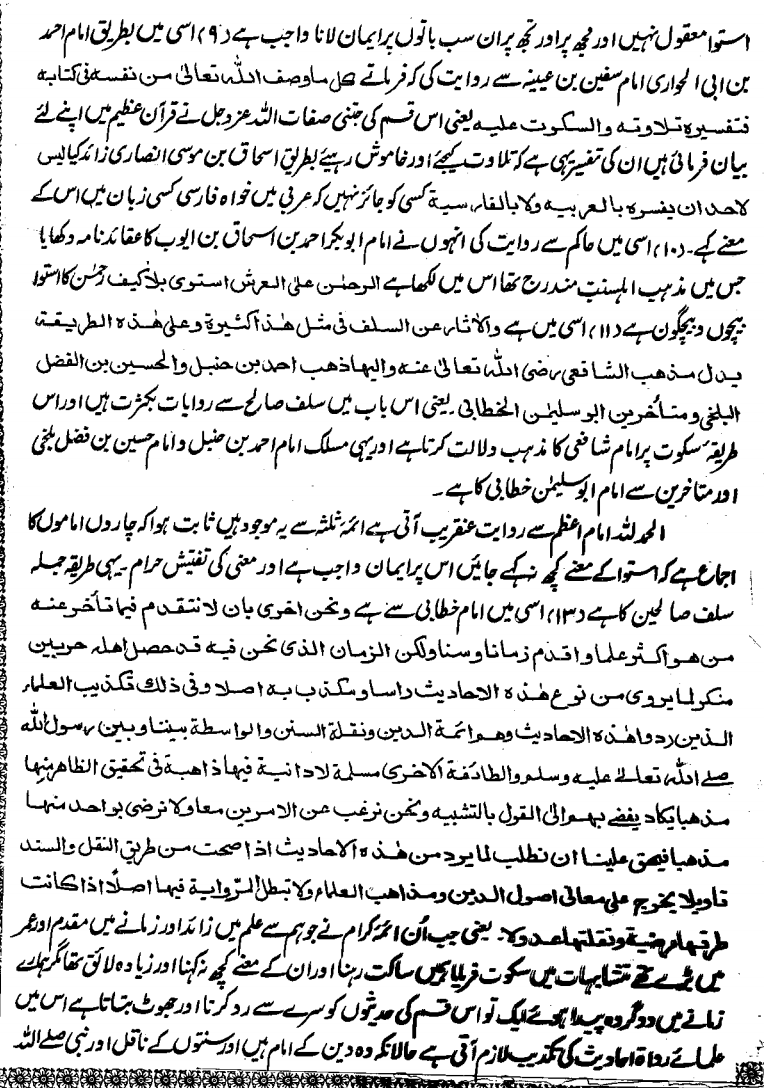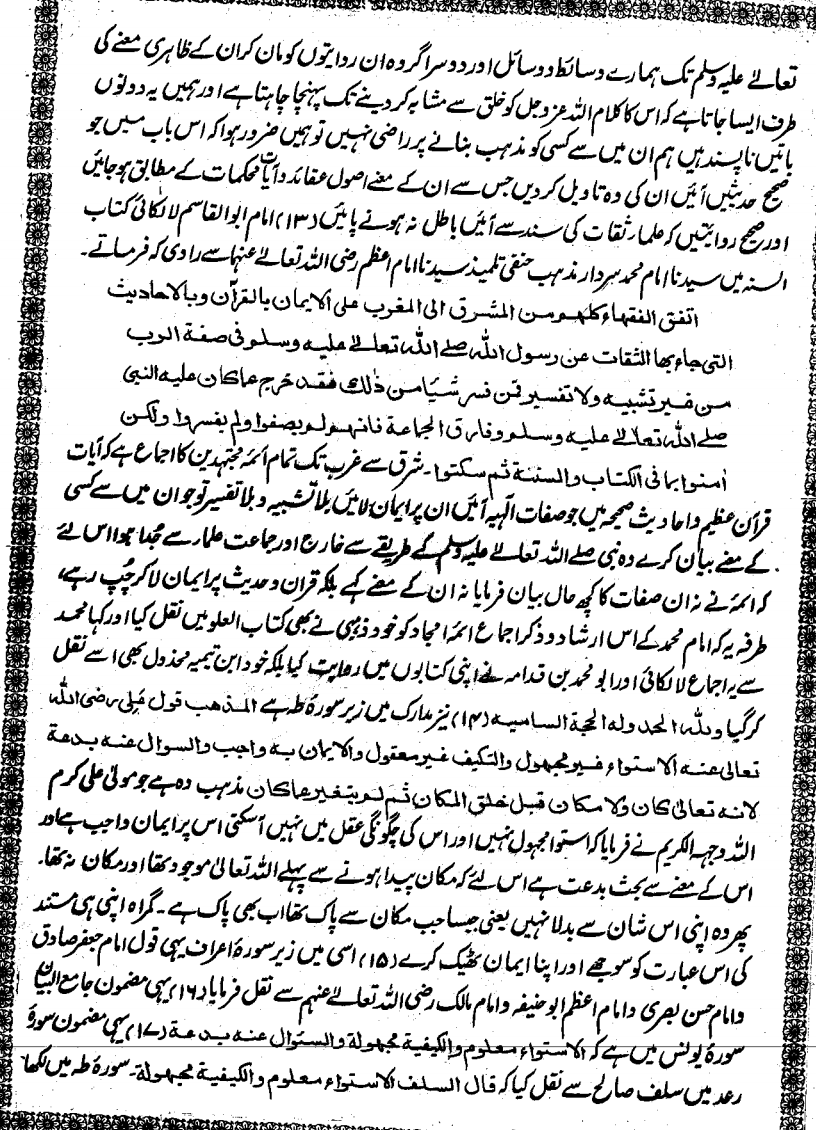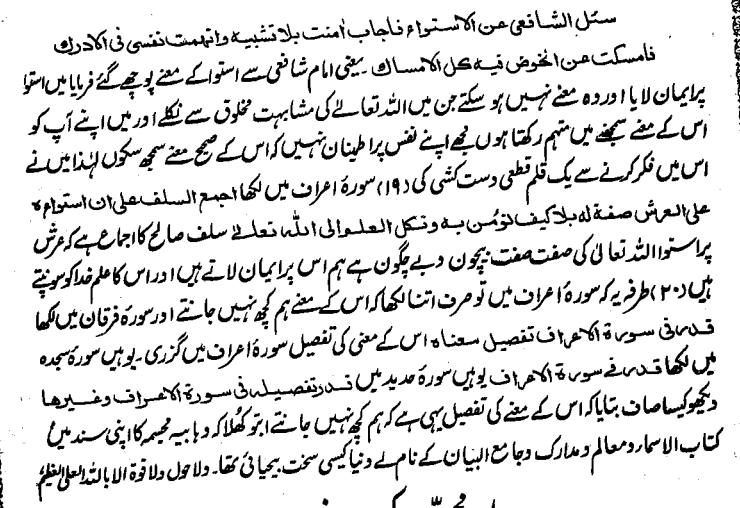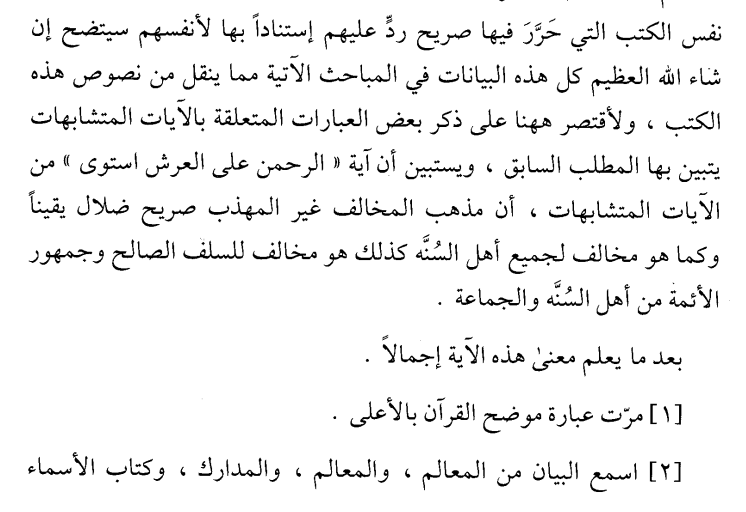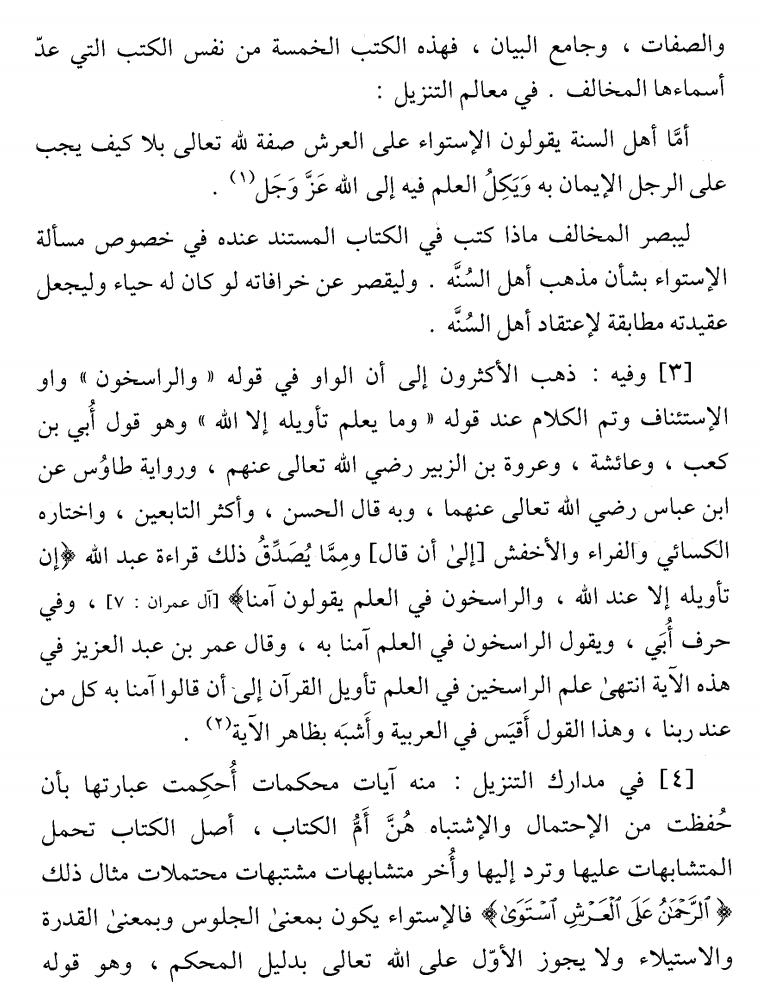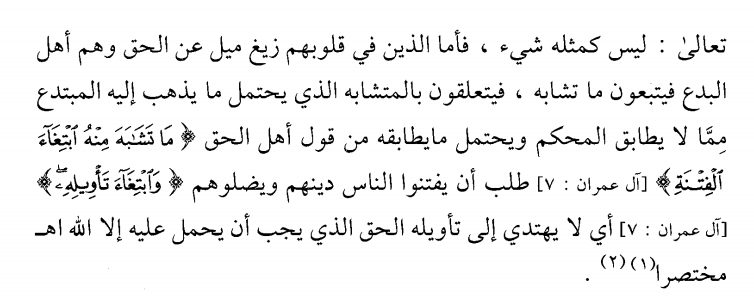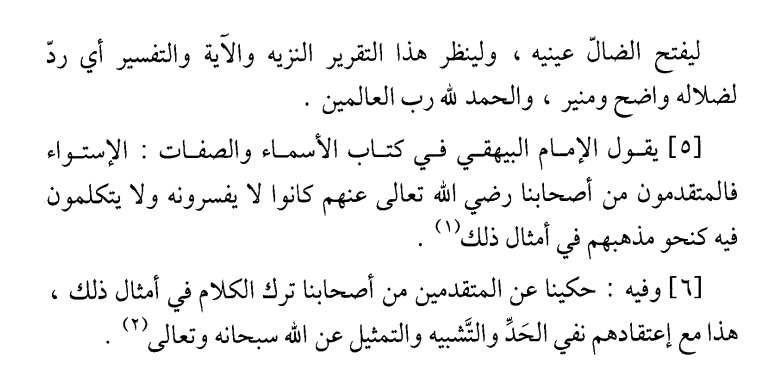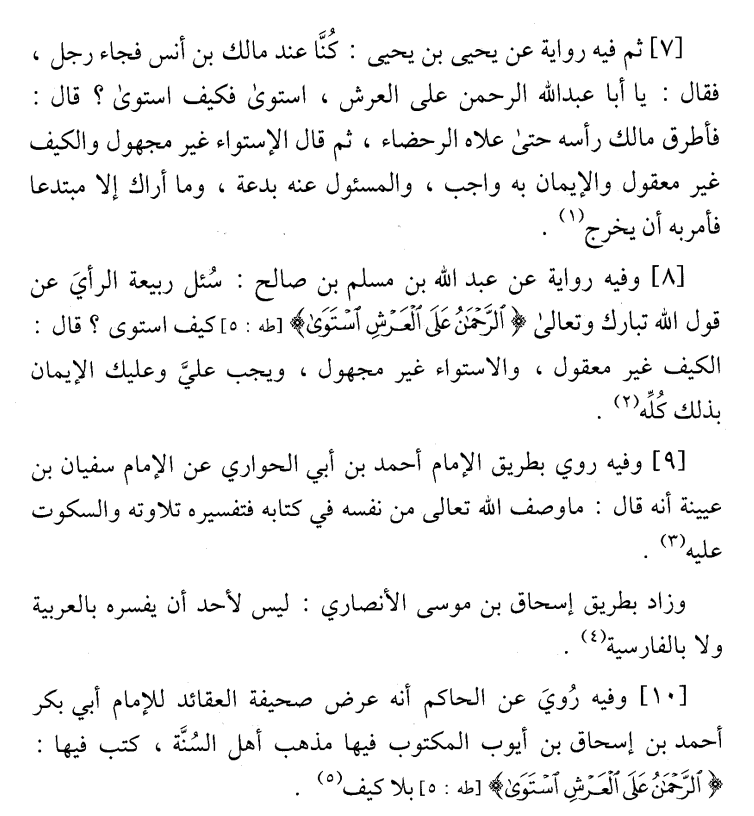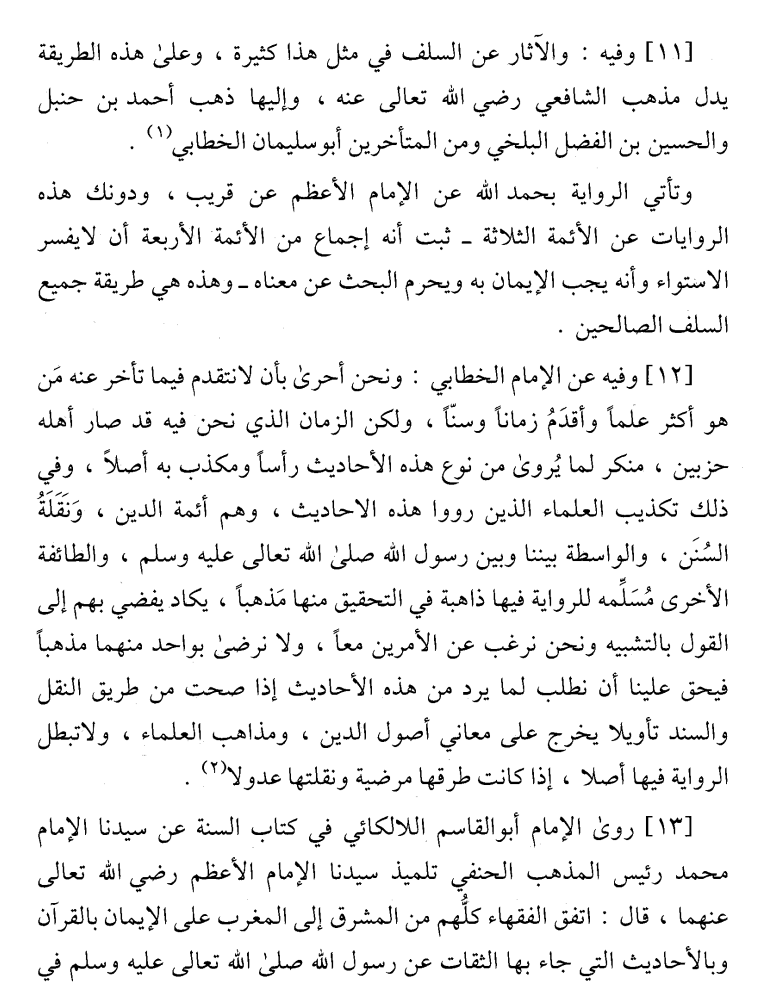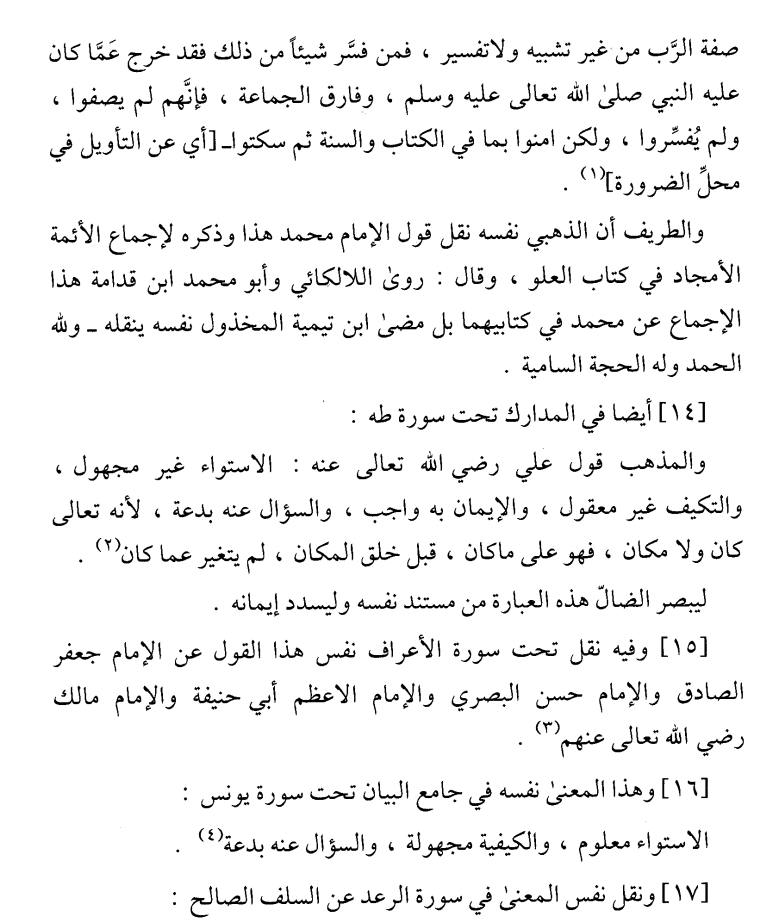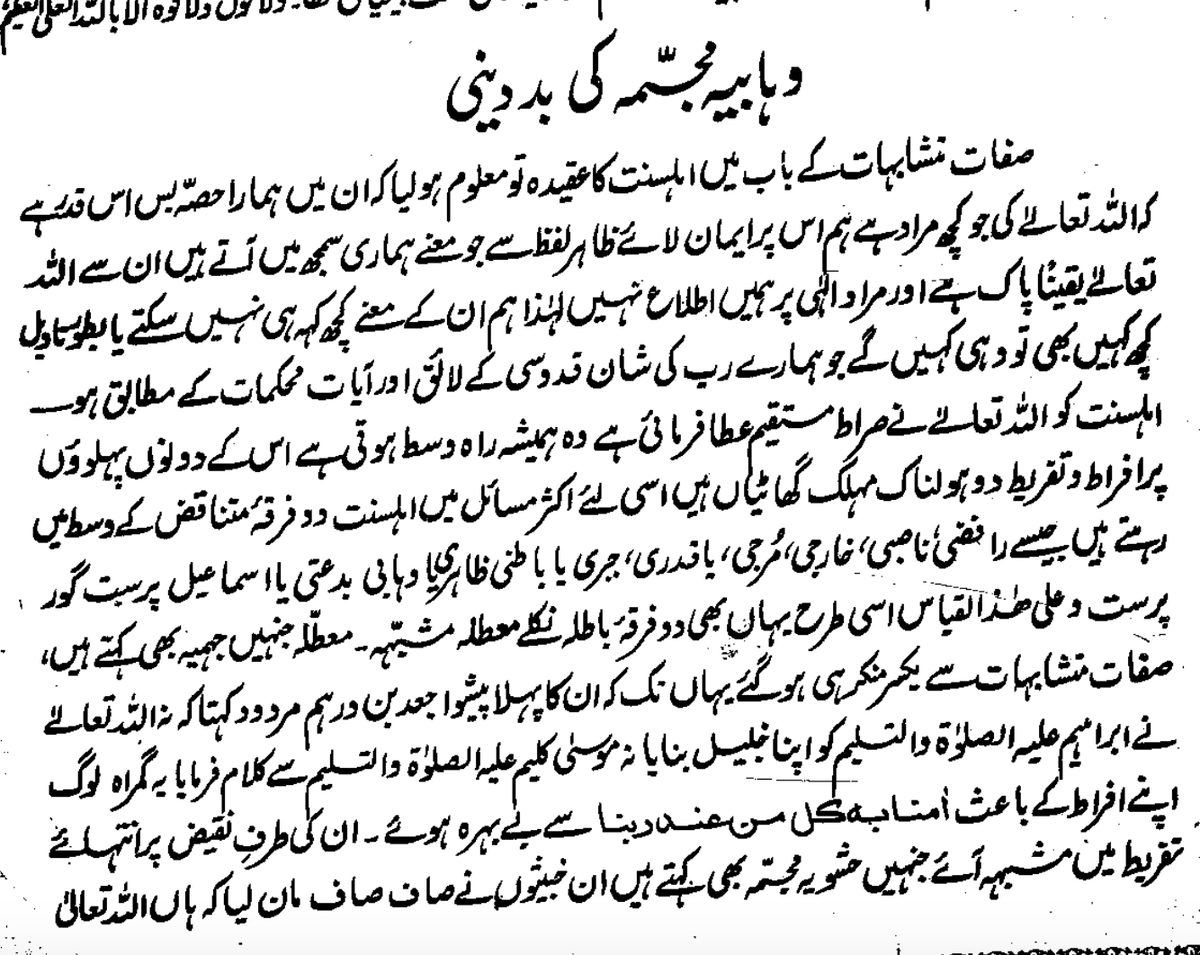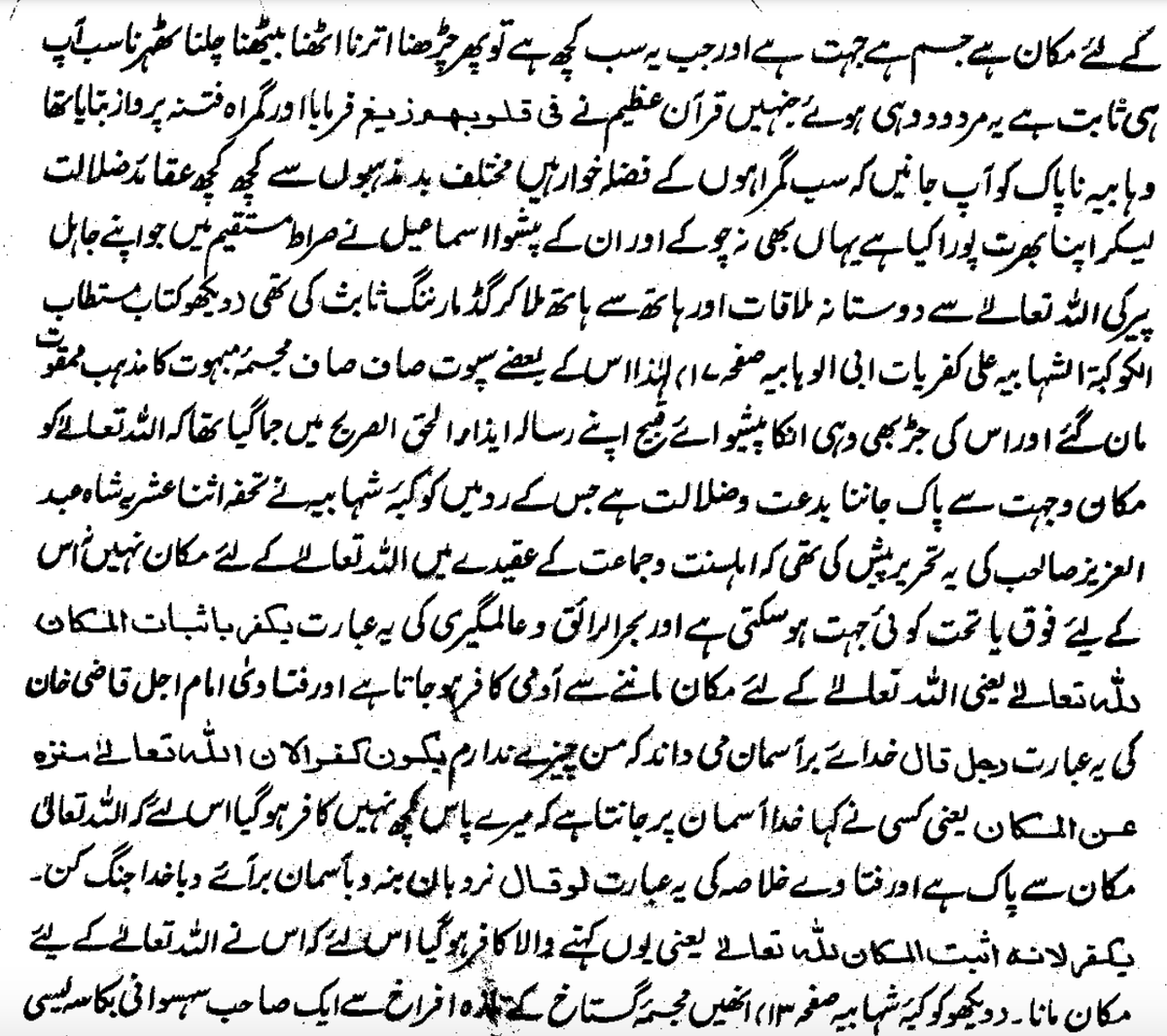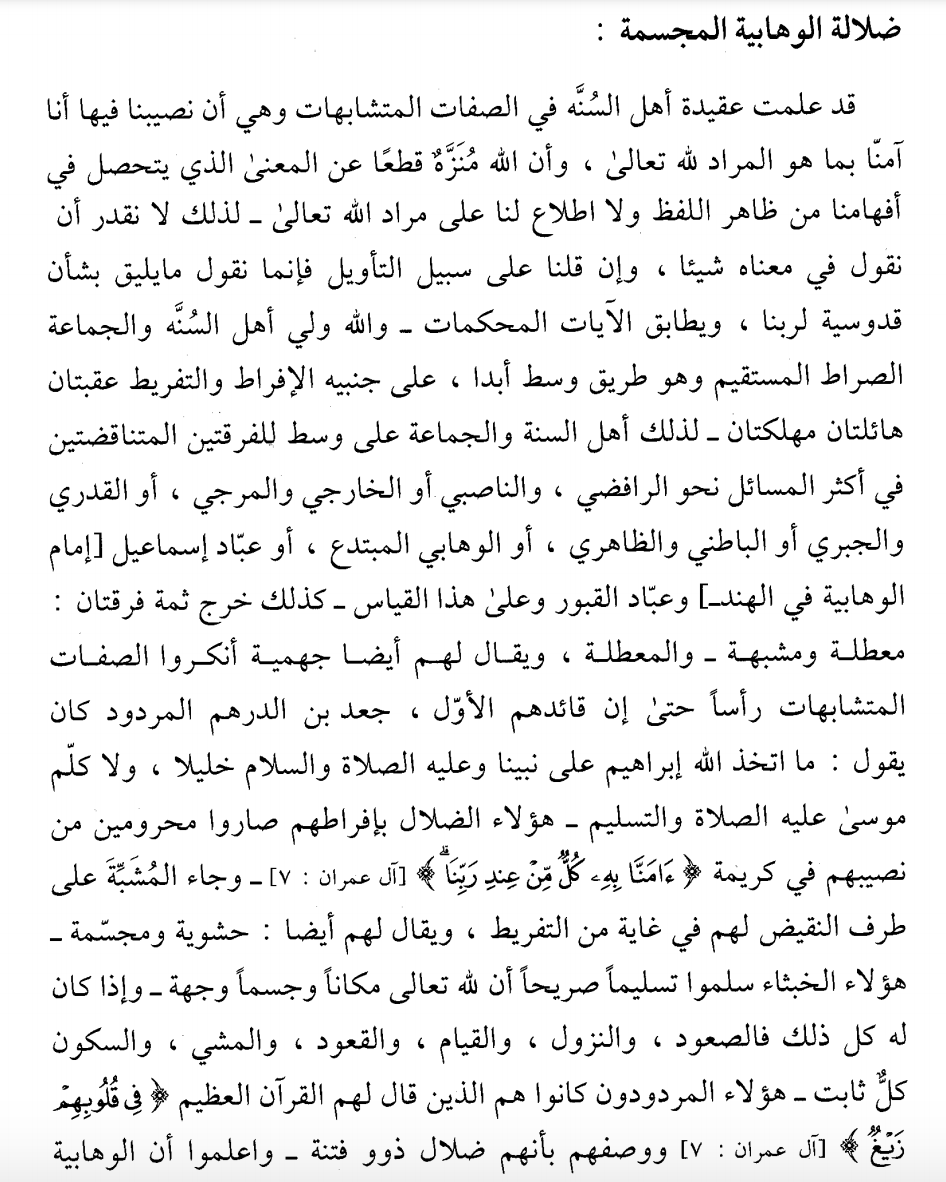REFUTATION OF ANTHROPOMORPHISTS
In 1318 AH / 1900 CE, Alahazrat Imām Aĥmad Riđā Khān al-Ĥanafī al-Qādirī al-Baraylawī [1272-1340 AH / 1856-1921 CE] authored a work named:
Qawāriý al-Qahhār ála al-Mujassimah al-Fujjār;
Blows of The Powerful upon Anthropomorphist Villains
In 1318 AH / 1900 CE, Alahazrat Imām Aĥmad Riđā Khān al-Ĥanafī al-Qādirī al-Baraylawī [1272-1340 AH / 1856-1921 CE] authored a work named:
Qawāriý al-Qahhār ála al-Mujassimah al-Fujjār;
Blows of The Powerful upon Anthropomorphist Villains
Alahazrat lists fifteen statements of belief from a Sunni perspective in this epistle:
1. Allāh táālā is free from every fault or flaw or shortcoming.
2. Everybody and everything is dependent upon Him; and He is not reliant on anything or anybody.
1. Allāh táālā is free from every fault or flaw or shortcoming.
2. Everybody and everything is dependent upon Him; and He is not reliant on anything or anybody.
3. He is transcendent from bearing any resemblance to the creation.
4. He does not change; He is as He was in pre-eternity and He shall be forever like He is now. It is impossible [muĥāl] that He was something before, then changed to becoming something else.
4. He does not change; He is as He was in pre-eternity and He shall be forever like He is now. It is impossible [muĥāl] that He was something before, then changed to becoming something else.
5. He is not a body and He is transcendent from everything that is suggestive of bodies.
6. He is transcendent from magnitude; one cannot say this much, this big and so forth.
6. He is transcendent from magnitude; one cannot say this much, this big and so forth.
[He is not] tall, wide, thick, thin, little or more, countable or weighable, big or small, heavy or light.
7. He is transcendent from having a shape – [He is] neither wide or narrow, nor spherical or long, nor triangular or conical, nor straight or oblique nor any other shape.
7. He is transcendent from having a shape – [He is] neither wide or narrow, nor spherical or long, nor triangular or conical, nor straight or oblique nor any other shape.
8. He is transcendent from having limits or extents; He is not ‘unlimited’ in the sense of being [physically] spread out without a limit; that is, He is free from any concept of magnitude.
In other words, when we say He is transcendent from limits, we mean negation of imposing any limits; not the attestation of unlimited magnitude.
9. He is not made from anything.
10. Parts and sections cannot be conceived or considered in Him, even hypothetically.
9. He is not made from anything.
10. Parts and sections cannot be conceived or considered in Him, even hypothetically.
11. He is free from directions or [having] edges or [being on a] side. One cannot say that He is on the right or left; or front and back; similarly, [in this sense of direction] He is not above.
12. He is not joined with anything in the creation such that He is in contact [with something].
13. He is not detached from the creation – to mean that there is a [physical] distance between Him and the creation.
14. He is transcendent from place and location.
13. He is not detached from the creation – to mean that there is a [physical] distance between Him and the creation.
14. He is transcendent from place and location.
15. He is transcendent from standing, sitting, descending, ascending, walking, stopping etc., and all conditions and requirements for bodies.
After mentioning these 15 beliefs, he writes:
❝In detail, there are countless beliefs relating to tanzīh [transcendence]. These 15 were mentioned here according to necessity, and besides these, the basis of all these matters are these 3 beliefs which were mentioned first, and
❝In detail, there are countless beliefs relating to tanzīh [transcendence]. These 15 were mentioned here according to necessity, and besides these, the basis of all these matters are these 3 beliefs which were mentioned first, and
even for these, the fundamental principle is the first belief, as it is the objective and summary of all meanings of tanzīh. Their dalīl is from all those āyāt in the Qur’ān e Áżīm in which the tasbīĥ, taqdīs, purity, independence, peerlessness, uniqueness of Bārī ázza wa jall
are declared. How numerous and vast are the verses of tasbīĥ themselves.
He said:
الملك القدوس السلام
❛The Badshāh [King], the Pure, free from every flaw.❜
He said:
فإن الله غني عن العالمين
❛Indeed, Allāh is Independent of the entire world.❜
He said:
He said:
الملك القدوس السلام
❛The Badshāh [King], the Pure, free from every flaw.❜
He said:
فإن الله غني عن العالمين
❛Indeed, Allāh is Independent of the entire world.❜
He said:
إن الله هو الغني الحميد
❛Indeed, Allāh is Independent, Most Praiseworthy.❜
He said:
ليس كمثله شيء
❛Nothing is of His likeness❜
He said:
هل تعلم له سميا
❛Do you know of any other with His name?❜
He said:
ولم يكن له كفوا أحد
❛There is none equal unto Him.❜
❛Indeed, Allāh is Independent, Most Praiseworthy.❜
He said:
ليس كمثله شيء
❛Nothing is of His likeness❜
He said:
هل تعلم له سميا
❛Do you know of any other with His name?❜
He said:
ولم يكن له كفوا أحد
❛There is none equal unto Him.❜
Āyāt with these meanings are a great many. These āyāt are muĥkamāt, they are ummu’l kitāb, there is no secret and abridgement in their meanings, there is fundamentally no ambiguity, whatever is clear and manifest, without concealment, from their explicit words, to believe in them
without change and alteration, without distinguishment and interpretation, is from the đarūriyāt e dīn e Islām [fundamental aspects of the religion of Islam].❞
THE BELIEF OF AHL E SUNNAT REGARDING ĀYĀT MUTASHĀBIHĀT
Allāh táālā stated:
هو الذي أنزل عليك الكتاب منه آيات محكمات هن أم الكتاب وأخر متشابهات فأما الذين في قلوبهم زيغ فيتبعون ما تشابه منه ابتغاء الفتنة وابتغاء تأويله وما يعلم تأويله إلا الله
Allāh táālā stated:
هو الذي أنزل عليك الكتاب منه آيات محكمات هن أم الكتاب وأخر متشابهات فأما الذين في قلوبهم زيغ فيتبعون ما تشابه منه ابتغاء الفتنة وابتغاء تأويله وما يعلم تأويله إلا الله
والراسخون في العلم يقولون آمنا به كل من عند ربنا وما يذكر إلا أولوا الألباب
The translation of it in Mawđiĥ’ul Qur’ān is as such:
❝He is the one who revealed the Book to you, some of its āyāt are clear, they are the foundation of the Book, and others are ambiguous.
The translation of it in Mawđiĥ’ul Qur’ān is as such:
❝He is the one who revealed the Book to you, some of its āyāt are clear, they are the foundation of the Book, and others are ambiguous.
Those whose hearts are deviated, they cling to the ambiguous ones, they seek misguidance and they seek their full meaning, and none knows their full meaning besides Allāh. Those who are of sound knowledge, they say that we have believed in it, all of it is from our Lord.
Only those who have intelligence understand what is explained.❞
He wrote in its fā’idah:
❝Allāh states that in His Kalām He has placed such matters whose meanings are not clear, thus those who are misguided, they use their minds for their meaning,
He wrote in its fā’idah:
❝Allāh states that in His Kalām He has placed such matters whose meanings are not clear, thus those who are misguided, they use their minds for their meaning,
and those who hold sound knowledge, they understand their meanings in line with other āyāt that are the foundation of the Book; if they are able to understand them in accordance with those, they understand them as such, and if they are not able, they leave it to Allāh,
that He knows best, we are only to believe.❞
I say: The matter is this, that Allāh táālā has revealed the Qur’ān Majīd for guidance and to trial and test people,
يضل به كثيرا ويهدي به كثيرا
By this Qur’ān He misguides many, and guides many by it.
I say: The matter is this, that Allāh táālā has revealed the Qur’ān Majīd for guidance and to trial and test people,
يضل به كثيرا ويهدي به كثيرا
By this Qur’ān He misguides many, and guides many by it.
The intention behind this guidance and misguidance is the āyāt of the Qur’ān Áżīm being of two types; muĥkamāt, the meaning of which are clear and unrestricted, such as the verses regarding the transcendence, independence, and uniqueness of Allāh táālā that have been mentioned
above, and the others are mutashābihāt, the meaning of which contain ambiguity, or by the apparent wording nothing is understood, such as the ĥurūf mutaqaţţiáāt الٓمٓ and others, or that which is understood is muĥāl [impossible] for Allāh ázza wa jall, such as,
الرحمن على العرش استوى
or
ثم استوی علی العرش
then those in whose hearts was deviation and misguidance, after forming their own interpretation, they began to deceive those without knowledge and spreading fitnah in the dīn by means of them, by saying it has come in the Qur’ān
or
ثم استوی علی العرش
then those in whose hearts was deviation and misguidance, after forming their own interpretation, they began to deceive those without knowledge and spreading fitnah in the dīn by means of them, by saying it has come in the Qur’ān
that Allāh is sat on the ársh, He has ascended the ársh, He has settled on the ársh, and they have forgotten the ayāt muĥkamāt which were the foundation of the Book, whereas in the Qur’ān Áżīm istiwā’a has come, and it is not necessary that its meaning be ascending, sitting,
settling. This is your own understanding which you are imposing upon Allāh,
ما أنزل الله بها من سلطان
Allāh has not revealed any authority for them
If, we suppose, these words came in the Qur’ān Majīd: ascending, sitting, settling, then by the command of the Qur’ān it was a
ما أنزل الله بها من سلطان
Allāh has not revealed any authority for them
If, we suppose, these words came in the Qur’ān Majīd: ascending, sitting, settling, then by the command of the Qur’ān it was a
farđ qaţýī to not understand them by their apparent meanings which come to our minds by these words, as these are acts of bodies [ajsām], and Allāh táālā is not a body [jism], however these people, due to their misguidance, have stuck to such meaning,
it is they regarding whom the Qur’ān Majīd states:
الذين في قلوبهم زيغ
Those whose hearts are deviated
Those people who were sound in knowledge and held guidance from their Lord, they understood that it is absolutely established from the ayāt muĥkamāt that Allāh táālā is
الذين في قلوبهم زيغ
Those whose hearts are deviated
Those people who were sound in knowledge and held guidance from their Lord, they understood that it is absolutely established from the ayāt muĥkamāt that Allāh táālā is
transcendent from place [makān], direction [jihat], body [jism], accidents [aá’rāđ], free from sitting, ascending, settling, as all these are flaws in respect to this flawless one, the explanation of which shall shortly come ان شاء اللہ المستعان, and He is free from all flaws.
In these [incorrect interpretations] there would result a need of Allāh ázza wa jall for His created ársh, and He is transcendent of every need. In these, similarity with creation would be established, because rising, sitting, ascending, descending, moving, settling,
are acts of bodies and He transcends all similarities to creation, then absolutely and certainly the apparent meanings of these words that come to our minds are certainly not intended, then what meaning should we take? Regarding this, there are two methodologies of guidance.
The majority stated that when these apparent meanings are absolutely not intended, and the interpretive meaning is not specified and defined, then what can we say from our behalf? It is better that we leave its knowledge to Allāh, our Lord has prohibited us from going after
āyāt mutashābihāt, and has stated that it is misguidance to dive into in its specified intent, thus why should we set foot outside of the limit? We should follow this part of the Qur’ān that,
آمنا به كل من عند ربنا
We believe in it, all of it is from our Lord
آمنا به كل من عند ربنا
We believe in it, all of it is from our Lord
Whatever is the intent of our Lord, we believe in that, the muĥkam and mutashābih; all are from our Lord.
This is the position of the majority of the imāms of the salaf, and it is this that is safer and superior, this is called the maslak of tafwđ and taslīm.
This is the position of the majority of the imāms of the salaf, and it is this that is safer and superior, this is called the maslak of tafwđ and taslīm.
These imāms stated that istiwā’a is known, meaning that it is indeed an Attribute of Allāh and the quiddity is unknown, that its meaning is beyond our understanding, and belief in it is obligatory, as it is established from the naşş qātiý Qur’ān, and it is bidáh to question it,
as questioning will not be done except in order to specify the intent, and there is no way to specify the intent.
Some opined that when Allāh ázza wa jall stated the two types; muĥkam and mutashābih, and declared that the muĥkamāt,
هن أم الكتاب
Some opined that when Allāh ázza wa jall stated the two types; muĥkam and mutashābih, and declared that the muĥkamāt,
هن أم الكتاب
They are the foundation of the Book
It is apparent that every subsidiary returns back to its origin, thus the noble verse has itself explained the way to interpret mustashābihāt, and has explained to us their correct standard, that form those correct and pure possibilities
It is apparent that every subsidiary returns back to its origin, thus the noble verse has itself explained the way to interpret mustashābihāt, and has explained to us their correct standard, that form those correct and pure possibilities
regarding them, by which they may come in line with their principle, meaning the muĥkamāt, and do not go to the way of fitnah, misguidance, bāţil and muĥāl. It is certain that they cannot rely upon their interpreted meaning, that it is this which is the intent of Allāh
ázza wa jall, however, when the meaning is clear and pure, free from and beyond contradicting the muĥkamāt, and can fit according to the language of the arabs, then what is the harm in explaining them as possibilities? The benefit in this is that the disposition of some of the
laity struggle to follow just this much, that we cannot say anything regarding their meanings, and when they are prohibited then their deliberation and desire [to know] will unnecessarily increase,
إن ابن آدم لحريص على ما منع
The son of Ādam desires that which he is forbidden
إن ابن آدم لحريص على ما منع
The son of Ādam desires that which he is forbidden
When they will deliberate on it, they will enter into fitnah and fall into misguidance, thus this is more fitting that their thoughts are steered towards a suitable and mild meaning that are in line with the muĥkamāt, in conformance with language, that they may find safety from
fitnah and misguidance. This is the maslak of many latter scholars who chose this whilst keeping in mind the state of the laity, this is called the maslak of ta’wīl.
These scholars did ta’wīl of this verse by many approaches, from these, four approaches are pure and clear:
First, istiwā’a having the meaning of subjugation [qahr] and domination. This is proven from and exhibited in the Arabic language. The ársh is above and higher than all
First, istiwā’a having the meaning of subjugation [qahr] and domination. This is proven from and exhibited in the Arabic language. The ársh is above and higher than all
creation, for this reason He sufficed by mentioning it, and the meaning is this: that Allāh subjugates and dominates all of creation.
Second, istiwā’a having the meaning of highness [úluww], and highness is an Attribute of Allāh ázza wa jall. Not highness of place,
Second, istiwā’a having the meaning of highness [úluww], and highness is an Attribute of Allāh ázza wa jall. Not highness of place,
but rather of lordship and might. These two meanings were mentioned by Imām Bahyaqī in Kitābu’l Asmā’a wa’s Şifāt, the passages of which shall come soon ان شاء اللہ تعالی.
Third, istiwā’a having the meaning of intention and will.
ثم استوی علی العرش
Third, istiwā’a having the meaning of intention and will.
ثم استوی علی العرش
That is, then He turned His attention to the ársh, meaning He intended its creation, that is, He began its creation. This ta’wīl was imparted by Imām e Ahl e Sunnat, Imām Abu’l Ĥasan Ashárī.
Imām Ismāýīl Đarīr stated: This is correct, narrated by Imām Jalāluddīn Suyūţī in Itqān.
Imām Ismāýīl Đarīr stated: This is correct, narrated by Imām Jalāluddīn Suyūţī in Itqān.
Fourth, istiwā’a having the meaning of ceasing and completing the matter, that is, the series of creation was completed with the ársh, nothing is found beyond that. Everything in this world and hereafter, whatever he has made and shall make, it is not beyond the scope of the ársh
as it encompasses all creation. The best tafsīr of the Qur’ān is that which is from the Qur’ān. Istiwā’a having the meaning of completion is from the Qur’ān Áżīm itself. Allāh táālā said:
ولما بلغ أشده واستوى
And when he reached his maturity and full strength
ولما بلغ أشده واستوى
And when he reached his maturity and full strength
Similar is His Word:
كزرع أخرج شطأه فآزره فاستغلظ فاستوى على سوقه
Like a cultivation that sprouted its shoot, then strengthened it, then thickened and then stood firm upon its stem
In these, istiwā’a is an expression for the state of perfection,
كزرع أخرج شطأه فآزره فاستغلظ فاستوى على سوقه
Like a cultivation that sprouted its shoot, then strengthened it, then thickened and then stood firm upon its stem
In these, istiwā’a is an expression for the state of perfection,
this ta’wīl was narrated by Imām Ĥāfiż’ul Ĥadīth Ibn al-Ĥajar Ásqalānī from Imām Abu’l Ĥasan Álī ibn Khalaf ibn Baţţāl, and it is the saying of Imām Abū Ţāhir Qazwīnī that he imparted in Sirāj’ul Úqūl, and is mentioned in the book of Imām Ábd’ul Wahhāb Shárānī, al-Yawāqīt.
I say: In addition to this, there is this; that in the Qur’ān Áżīm this istiwā’a is mentioned in seven places, in all seven places it is mentioned along with the creation of the heavens and the earth, and comes after it without separation.
He stated in Sūrah Aárāf and Sūrah Yūnus عليه الصلاة والسلام:
إن ربكم الله الذي خلق السماوات والأرض في ستة أيام ثم استوى على العرش
Indeed your Lord is Allāh Who created the heavens and the earth in six days, then He made istiwā’a on the ársh.
إن ربكم الله الذي خلق السماوات والأرض في ستة أيام ثم استوى على العرش
Indeed your Lord is Allāh Who created the heavens and the earth in six days, then He made istiwā’a on the ársh.
He stated in Sūrah Rád:
الله الذي رفع السماوات بغير عمد ترونها ثم استوى على العرش
Allah is He who raised up the heavens without the pillars that you can see, then He made istiwā’a on the ársh.
He stated in Sūrah Ţā-Hā ﷺ:
تنزيلا ممن خلق الأرض والسماوات العلى
الله الذي رفع السماوات بغير عمد ترونها ثم استوى على العرش
Allah is He who raised up the heavens without the pillars that you can see, then He made istiwā’a on the ársh.
He stated in Sūrah Ţā-Hā ﷺ:
تنزيلا ممن خلق الأرض والسماوات العلى
الرحمن على العرش استوى
Sent down by One Who created the earth and the lofty heavens. Raĥmān made istiwā’a on the ársh.
It is in Sūrah Furqān:
الذي خلق السماوات والأرض وما بينهما في ستة أيام ثم استوى على العرش
Sent down by One Who created the earth and the lofty heavens. Raĥmān made istiwā’a on the ársh.
It is in Sūrah Furqān:
الذي خلق السماوات والأرض وما بينهما في ستة أيام ثم استوى على العرش
The One Who created the heavens and the earth and all that is between them in six days, then He made istiwā’a on the ársh.
He stated in Sūrah Ĥadīd:
هو الذي خلق السماوات والأرض في ستة أيام ثم استوى على العرش
He stated in Sūrah Ĥadīd:
هو الذي خلق السماوات والأرض في ستة أيام ثم استوى على العرش
It is He Who created the heavens and the earth in six days, then He made istiwā’a on the ársh.
These meanings, briefly mentioned from the first one till here, their elaborations are evident in the lofty words of many imāms of the dīn,
These meanings, briefly mentioned from the first one till here, their elaborations are evident in the lofty words of many imāms of the dīn,
if they are all mentioned the book would be great, and it is necessary upon this faqīr to narrate the passages of the books whose names the obscure opponent has written in order to lead astray the laity, in refutation,
so that the Muslim may see to what extent the Wahābī is shameless, fearless, deceitful, cunning, deviant, and impure. That those books in which the clear refutation of their heresies are written, they write their names in their support.
Persian verse:
چہ دلاور ست دزدے کہ بکف چراغ دارد
How bold is the thief, that in his hand he holds a lamp
چہ دلاور ست دزدے کہ بکف چراغ دارد
How bold is the thief, that in his hand he holds a lamp
In the forthcoming research, the passages of those books shall be quoted, if Allāh wills, from these all these explanations shall become clear. Here I shall quote only some passages relating to āyāt mutashābihāt, by which the previous discussion becomes clear,
and that it becomes apparent that the noble āyah,
الرحمن على العرش استوى
is from the āyāt mutashābihāt, and also just as the incorrect opinion of the opponent is certainly clear misguidance and opposes all of Ahl al-Sunnah, similarly, by his understanding of the meaning of
الرحمن على العرش استوى
is from the āyāt mutashābihāt, and also just as the incorrect opinion of the opponent is certainly clear misguidance and opposes all of Ahl al-Sunnah, similarly, by his understanding of the meaning of
this āyah, he is opposing the Salaf al-Şāliĥ and the jumhúr of scholars from Ahl al-Sunnah wa& #39;l Jamāáh.
(1) The passage from Mawđiĥ’ul Qur’ān has been mentioned above.
(2) Listen to the explanations of Máālim, Madārik, Kitābu’l Asmā’a wa’s Şifāt, and Jāmiý al-Bayān here,
(1) The passage from Mawđiĥ’ul Qur’ān has been mentioned above.
(2) Listen to the explanations of Máālim, Madārik, Kitābu’l Asmā’a wa’s Şifāt, and Jāmiý al-Bayān here,
as these five books are also from those books whose names are listed by the opponent.
It is in Máālim al-Tanzīl:
❝As for Ahl al-Sunnah, they say that istiwā’a on the ársh is an Attribute of Allāh táālā, without modality. It is obligatory for a person to believe in it,
It is in Máālim al-Tanzīl:
❝As for Ahl al-Sunnah, they say that istiwā’a on the ársh is an Attribute of Allāh táālā, without modality. It is obligatory for a person to believe in it,
and to leave the knowledge regarding it to Allāh ázza wa jall.❞
The opponent should observe what is written in the book he used in his support, regarding the madh’hab of Ahl al-Sunnah on the issue of istiwā’a. If he has shame, then he should stop his nonsense and make his
The opponent should observe what is written in the book he used in his support, regarding the madh’hab of Ahl al-Sunnah on the issue of istiwā’a. If he has shame, then he should stop his nonsense and make his
aqīdah in line with the Ahl al-Sunnah.
(3) It is in that:
❝The majority are of the opinion that the و in His saying, والراسخون, is the و of separation, and that the statement was completed with His saying,
وما يعلم تأويله إلا الله
And none knows its meaning except Allāh
(3) It is in that:
❝The majority are of the opinion that the و in His saying, والراسخون, is the و of separation, and that the statement was completed with His saying,
وما يعلم تأويله إلا الله
And none knows its meaning except Allāh
That is the opinion of Ubayy ibn Kaáb, Áayishah, Úrwah ibn al-Zubayr, may Allāh táālā be pleased with them, and a narration of Ţāwūs from Ibn Ábbās, may Allāh táālā be pleased with them, and this is the opinion of Ĥasan and the majority of Tābiýīn, and Kisā’ī chose this,
and Farrā’a and Akhfash. From what affirms this is a recitation of Ábdullāh [ibn Masúūd],
إن تأويله إلا عند الله والراسخون في العلم يقولون آمنا
the meaning of it is only with Allāh, and those sound in knowledge say, “We believed in it”, and in the recitation of Ubayy,
إن تأويله إلا عند الله والراسخون في العلم يقولون آمنا
the meaning of it is only with Allāh, and those sound in knowledge say, “We believed in it”, and in the recitation of Ubayy,
ويقول الراسخون في العلم آمنا به
and those sound in knowledge say, “We believed in it”.
Úmar ibn Ábd al-Ázīz said regarding this āyah, “The limit of knowledge of those sound in knowledge regarding ta& #39;wīl of the Qur’ān is that they say, ‘We believed in it, all is from our Lord’”.
and those sound in knowledge say, “We believed in it”.
Úmar ibn Ábd al-Ázīz said regarding this āyah, “The limit of knowledge of those sound in knowledge regarding ta& #39;wīl of the Qur’ān is that they say, ‘We believed in it, all is from our Lord’”.
This statement is in proportion with the Arabic language and resembles the apparent of the āyah.❞
(4) It is in Madārik al-Tanzīl:
❝Of it, some āyāt are muĥkamāt, their meanings are clear, they are protected from possibilities and doubts, they are the foundation of the Book.
(4) It is in Madārik al-Tanzīl:
❝Of it, some āyāt are muĥkamāt, their meanings are clear, they are protected from possibilities and doubts, they are the foundation of the Book.
The mutashābihāt are understood according to them, and referred back to them. And others are mutashābihāt, they have possibilities, an example of that is,
الرحمن على العرش استوى
istiwā’a can be with the meaning of sitting, or power and subjugation.
الرحمن على العرش استوى
istiwā’a can be with the meaning of sitting, or power and subjugation.
The first is not possible for Allāh táālā, with the muĥkam evidence, that is His saying,
ليس كمثله شيء
Nothing is of His likeness
As for those in whose hearts is disease, they deviated from the truth, and they are the people of bidáh, so they pursue what is ambiguous of it.
ليس كمثله شيء
Nothing is of His likeness
As for those in whose hearts is disease, they deviated from the truth, and they are the people of bidáh, so they pursue what is ambiguous of it.
They cling to the mutashābih; those in which there is possibility of what the innovators say from that which does not align with the muĥkam, and there is the possibility of it being in line with the muĥkam from the saying of the people of truth.
منه ابتغاء الفتنة
منه ابتغاء الفتنة
He sought to cause fitnah among the people in terms of their dīn, and lead them astray,
وابتغاء تأويله
and he sought to interpret it with a ta’wīl that he desires,
وما يعلم تأويله إلا الله
that is, none guides to its true meaning, the one that it is necessary to be understood
وابتغاء تأويله
and he sought to interpret it with a ta’wīl that he desires,
وما يعلم تأويله إلا الله
that is, none guides to its true meaning, the one that it is necessary to be understood
upon, except Allāh.❞
The misguided individual should open his eyes and see how this pure explanation, this āyah and tafsīr, is a clear and enlightening refutation of his misguidance.
(5) Imām Bayhaqī states in Kitābu’l Asmā’a wa’s Şifāt:
❝Istiwā’a: The early ones from our
The misguided individual should open his eyes and see how this pure explanation, this āyah and tafsīr, is a clear and enlightening refutation of his misguidance.
(5) Imām Bayhaqī states in Kitābu’l Asmā’a wa’s Şifāt:
❝Istiwā’a: The early ones from our
companions would not make tafsīr of it, nor would they speak regarding it, as was their madh’hab in terms of such things [i.e. Attributes].❞
(6) It is in this:
❝We have narrated from the early ones from our companions, leaving speech in such things, this along with their
(6) It is in this:
❝We have narrated from the early ones from our companions, leaving speech in such things, this along with their
belief of negating a limit [hadd], and similarity [tashbīh], and likeness [tamthīl] for Allāh.❞
(7) In this he narrated from Yaĥyā ibn Yaĥyā:
❝We were with Mālik ibn Anas, then a man came and said Yā Abū Ábdullāh,
الرحمن على العرش استوى
What is the modality of istiwā’a?
(7) In this he narrated from Yaĥyā ibn Yaĥyā:
❝We were with Mālik ibn Anas, then a man came and said Yā Abū Ábdullāh,
الرحمن على العرش استوى
What is the modality of istiwā’a?
He said: Mālik lowered his head until he was covered in sweat, then he said, Istiwā’a is not unknown, and the modality cannot be perceived, belief in it is obligatory [fard], to investigate its meaning is heresy [bidáh], and I do not see you except as an innovator, then he
commanded he be removed.❞
(8) In this he narrated from Ábdullāh ibn Şāliĥ ibn Muslim:
❝Rabīáh al-Ra’y was asked about the saying of Allāh táālā,
الرحمن على العرش استوى
How did he do istiwā’a?
He said, “The modality cannot be perceived, and istiwā’a is not unknown,
(8) In this he narrated from Ábdullāh ibn Şāliĥ ibn Muslim:
❝Rabīáh al-Ra’y was asked about the saying of Allāh táālā,
الرحمن على العرش استوى
How did he do istiwā’a?
He said, “The modality cannot be perceived, and istiwā’a is not unknown,
and it is obligatory upon myself and yourself to believe in that in totality.”❞
(9) In this, by the route of Imām Aĥmad ibn Abi’l Ĥawarī narrating from Imām Sufyān ibn Úyaynah, that he would say:
❝That which Allāh táālā has Attributed to Himself in His Book, then its tafsīr
(9) In this, by the route of Imām Aĥmad ibn Abi’l Ĥawarī narrating from Imām Sufyān ibn Úyaynah, that he would say:
❝That which Allāh táālā has Attributed to Himself in His Book, then its tafsīr
is its recitation and staying silent about it.❞
By the route of Is’ĥāq ibn Mūsā Anşārī, he added:
❝It is not for anyone to explain its meaning in Arabic nor in Persian.❞
(10) In that, he narrated from Ĥākim that he presented the Book of Áqidah by Imām Abū Bakr ibn Is’ĥāq
By the route of Is’ĥāq ibn Mūsā Anşārī, he added:
❝It is not for anyone to explain its meaning in Arabic nor in Persian.❞
(10) In that, he narrated from Ĥākim that he presented the Book of Áqidah by Imām Abū Bakr ibn Is’ĥāq
ibn Ayyūb, in which the madh’hab of Ahl al-Sunnah was written, in this it is written:
❝Raĥmān made istiwā’a on the ársh without modality.❞
It is in that:
❝And the reports from the Salaf similar to this are many, and the madh’hab of Shāfiýī points to this way.
❝Raĥmān made istiwā’a on the ársh without modality.❞
It is in that:
❝And the reports from the Salaf similar to this are many, and the madh’hab of Shāfiýī points to this way.
Aĥmad ibn Ĥanbal went towards it, Ĥusayn ibn al-Fađl al-Balkhī, and from the latter scholars, Abū Sulaymān al-Khaţţābī.❞
Alĥamdulillāh, a report from Imām al-Aázam is soon to come, and this is found from the three Imāms; it is established that the ijmāá of the four imāms that
Alĥamdulillāh, a report from Imām al-Aázam is soon to come, and this is found from the three Imāms; it is established that the ijmāá of the four imāms that
nothing be said regarding the meaning of istiwā’a, to believe in it is wājib, and to investigate the meaning is ĥarām. This is the methodology of all the Salaf al- Şāliĥīn.
(12) In that, from Imām Khaţţābī:
It is more fitting for us, not to go forth in what those who were
(12) In that, from Imām Khaţţābī:
It is more fitting for us, not to go forth in what those who were
greater in knowledge, and preceded our era, and elder than us, stayed behind in doing. However the times which we are in, its people have become of two groups, [one] rejects what was narrated from these kinds of aĥādīth directly and denies them completely, and in that is
accusing the scholars of lying; the ones who narrated these aĥādīth. And they are the imāms of the dīn, transmitters of the sunnah and the means between us and RasūlAllāh ﷺ. And the other group, accepting these narrations, goes to their apparent meanings to such an extent that
their speech reaches the level of tashbīh, and we detest both matters and we are not pleased by taking either of them as a madh’hab. Then, it is necessary upon us to do ta’wīl of those şaĥīĥ aĥādīth in this matter, with meanings that are in line with
the usul of the dīn and the madh’habs of the scholars, and not negate the narrations regarding this completely, when its routes are satisfactory and upright narrators have transmitted them.❞
(13) Imām Abu’l Qāsim Lālakā’ī in Kitāb al-Sunnah narrates from Sayyidunā Imām Muĥammad
(13) Imām Abu’l Qāsim Lālakā’ī in Kitāb al-Sunnah narrates from Sayyidunā Imām Muĥammad
leader of the Ĥanafī madh’hab, student of Sayyidunā Imām al-Aáżam, may Allāh be pleased with them, that he said:
❝All the jurists have agreed, from the east to the west, in believing upon the Qur’ān and aĥādīth that are brought by trustworthy narrators from RasūlAllāh ﷺ,
❝All the jurists have agreed, from the east to the west, in believing upon the Qur’ān and aĥādīth that are brought by trustworthy narrators from RasūlAllāh ﷺ,
in regards to the Attributes of the Lord, without tashbīh [similitude], and without tafsīr. Thus, the one who explains anything from that, then he has exited what the Nabī ﷺ was upon, and has split from the jamāáh, for indeed they did not describe nor explain, but they believed
what is in the Book and Sunnah, then they remained silent.❞
The marvel is that this statement of Imām Muĥammad and his mention of ijmāá of the great imāms, has been been transmitted by Dhahabī himself in Kitāb al-Úluww, and he said that Lālakā’ī and
The marvel is that this statement of Imām Muĥammad and his mention of ijmāá of the great imāms, has been been transmitted by Dhahabī himself in Kitāb al-Úluww, and he said that Lālakā’ī and
Abū Muĥammad ibn Qudāmah narrated this ijmāá from Muĥammad. In fact, Ibn Taymiyyah makhzūl [forsaken] has also transmitted it. ولله الحمد وله الحجة السامية
(14) In Madārik, under Sūrah Ţā-Hā:
❝The madh& #39;hab is the statement of Álī, may Allāh be pleased with him,
(14) In Madārik, under Sūrah Ţā-Hā:
❝The madh& #39;hab is the statement of Álī, may Allāh be pleased with him,
“Istiwā’a is not unknown, and its modality cannot be perceived, belief in it is obligatory, and investigating it is bidáh, because He was present when there was no place, thus He is as He was, He did not change from what He was.”❞
The deviant should look at this passage from
The deviant should look at this passage from
the book he presented in his support and correct his īmān.
(15) In this, under Sūrah Aárāf, this statement is transmitted from Imām Jáfar al-Şādiq, Imām Ĥasan Başrī, Imām al-Aáżam Abū Ĥanīfah and Imām Mālik, may Allāh be pleased with them.
(15) In this, under Sūrah Aárāf, this statement is transmitted from Imām Jáfar al-Şādiq, Imām Ĥasan Başrī, Imām al-Aáżam Abū Ĥanīfah and Imām Mālik, may Allāh be pleased with them.
(16) This import is in Jamiý al-Bayān under Sūrah Yūnus:
❝Istiwā’a is known, the modality is unknown, and investigating it is bidáh.❞
(17) This import is under Sūrah Rád, transmitted from the Salaf al-Şāliĥ:
❝The Salaf said that istiwā’a is known, the modality is unknown.❞
❝Istiwā’a is known, the modality is unknown, and investigating it is bidáh.❞
(17) This import is under Sūrah Rád, transmitted from the Salaf al-Şāliĥ:
❝The Salaf said that istiwā’a is known, the modality is unknown.❞
(18) It is written in Sūrah Ţā-Hā:
❝Shafiyī was asked regarding istiwā’a, he replied, “I believe in it without tashbīh, I do not trust myself in understanding, and I kept myself from discussing it strictly.”❞
(19) He wrote in Sūrah Aárāf:
❝The Salaf agreed that His istiwā’a
❝Shafiyī was asked regarding istiwā’a, he replied, “I believe in it without tashbīh, I do not trust myself in understanding, and I kept myself from discussing it strictly.”❞
(19) He wrote in Sūrah Aárāf:
❝The Salaf agreed that His istiwā’a
on the ársh is an Attribute of His without modality, we believe in it, and we leave the knowledge of it to Allāh táālā.❞
(20) The marvel is that in Sūrah Aárāf he only wrote this much; that we do not know its meaning, and in Sūrah Furqān he wrote:
❝The detail of its meaning
(20) The marvel is that in Sūrah Aárāf he only wrote this much; that we do not know its meaning, and in Sūrah Furqān he wrote:
❝The detail of its meaning
has been mentioned in Sūrah Aárāf.❞
Similarly, he wrote in Sūrah Sajdah, ❝It has been mentioned in Sūrah Aárāf❞, similarly in Sūrah Ĥadīd, ❝Its detail has been mentioned in Sūrah Aárāf.❞
Look at how he clearly stated that the details of its meaning is that we do not know.
Similarly, he wrote in Sūrah Sajdah, ❝It has been mentioned in Sūrah Aárāf❞, similarly in Sūrah Ĥadīd, ❝Its detail has been mentioned in Sūrah Aárāf.❞
Look at how he clearly stated that the details of its meaning is that we do not know.
Now it is apparent that the Wahābiyyah Mujassimah taking support with the names of Kitābu’l Asmā’a wa’s Şifāt, Máālim, Madārik, and Jāmiý al-Bayān was extreme shamelessness.
ولا حول ولا قوة الا بالله العلي العظيم
ولا حول ولا قوة الا بالله العلي العظيم
The Heresy of the Wahābiyyah Mujassimah
We have come to know the belief of Ahl al-Sunnah in regarding āyāt mutashābihāt, that our portion is just this much: that whatsoever is the intention of Allāh táālā, we believe in that.
We have come to know the belief of Ahl al-Sunnah in regarding āyāt mutashābihāt, that our portion is just this much: that whatsoever is the intention of Allāh táālā, we believe in that.
Those meanings that come to our minds from the apparent wording, Allāh táālā is certainly pure from them, and we are not informed what the intention of Allāh is, for that reason we cannot utter anything regarding their meanings, or if we do utter something as a form of ta’wīl,
then we will say that which is befitting the sacred rank of our Lord and is in accordance to the āyāt muĥkamāt.
Allāh táālā has bestowed the Ahl al-Sunnah the straight path, they are always upon the middle path, and on either side there is excess and paucity;
Allāh táālā has bestowed the Ahl al-Sunnah the straight path, they are always upon the middle path, and on either side there is excess and paucity;
two perilous and dangerous paths. For this reason, the Ahl al-Sunnah remain between two opposing sects in most matters, such as Rāfiđī and Nāşibī, or Khārijī and Murjī, or Qadarī and Jabarī, or Bātinī and Żāhirī, or Wahābī and Mubtadí,
or worshippers of Ismāyīl [Dihlawī] and grave-worshippers, and upon this analogy.
Similarly, two sects of falsehood emerged here too; Muáţţilah and Mushabbihah.
Muáţţilah, who are also called Jahmiyyah, became complete rejectors of the mutashābihāt Attributes,
Similarly, two sects of falsehood emerged here too; Muáţţilah and Mushabbihah.
Muáţţilah, who are also called Jahmiyyah, became complete rejectors of the mutashābihāt Attributes,
to the extent that their first leader Jád ibn Dirham mardūd [outcast] would say that Allāh táālā has not made Ibrāhīm, upon him be peace and salutation, His Khalīl and nor did He speak to Mūsā Kalīm, upon him be peace and salutation.
These misguided folk were deprived of the benefit of, “We believe in it, all of it is from our Lord”, due to their excessiveness.
In their opposite direction, the Mushabbihah emerged in the extremity of excess, who are also called Ĥashawiyyah and Mujassimah.
In their opposite direction, the Mushabbihah emerged in the extremity of excess, who are also called Ĥashawiyyah and Mujassimah.
These impure ones openly accepted that indeed, Allāh táālā is in a place [makān], has a body [jism], is in a direction [jihat]. These outcasts became those regarding whom the Qur’ān Áżīm has stated, “in their hearts is crookedness”, and stated that they are misguided,
makers of mischief [fitnah]. You should know that the impure [nā-pāk] Wahābiyyah are the consumers of the filth of all who are misguided; they have taken various misguided beliefs from different deviants and filled their vessel [to the brim], not only a slight amount.
Their leader Ismāýīl in Sirāţ Mustaqīm affirmed for his ignorant pīr that Allāh táālā had a friendly meeting with him, and holding his hand, conversed with him, for this reason some of his dutiful offspring clearly accepted the repulsive way of the dazed Mujassimah.
Its root is also that which their vile leader established in his monograph Yīđāĥ al-Ĥaqq al-Şarīĥ, that to consider Allāh táālā to be transcendent of place and direction is innovation [bidát] and misguidance [đalālat].
In refutation of this I presented the writing of Shāh Ábd al-Áziz Dihlawī in Tuĥfah Ithna Áshariyyah, that the belief of Ahl al-Sunnah wa’l Jamāáh is that Allāh táālā is not in a place, nor can there be above or beneath or any direction for Him.
And this passage from Baĥr ar-Rā’iq and Áālamgīrī:u2028u2028
“He commits kufr by affirming a place for Allāh táālā”
This passage of the Fatāwā Imām Ajal Qāđī Khān:u2028u2028
“A man says, ‘Allāh upon the heaven knows that I have nothing’,
“He commits kufr by affirming a place for Allāh táālā”
This passage of the Fatāwā Imām Ajal Qāđī Khān:u2028u2028
“A man says, ‘Allāh upon the heaven knows that I have nothing’,
this is kufr as Allāh táālā is transcendent of place.”
This passage of Fatāwā Khulāşah:
“If he says, ‘Take a spear and go to the heaven and fight with Allāh’, then he commits kufr, because he affirmed place for Allāh táālā.”
This passage of Fatāwā Khulāşah:
“If he says, ‘Take a spear and go to the heaven and fight with Allāh’, then he commits kufr, because he affirmed place for Allāh táālā.”

 Read on Twitter
Read on Twitter![REFUTATION OF ANTHROPOMORPHISTSIn 1318 AH / 1900 CE, Alahazrat Imām Aĥmad Riđā Khān al-Ĥanafī al-Qādirī al-Baraylawī [1272-1340 AH / 1856-1921 CE] authored a work named:Qawāriý al-Qahhār ála al-Mujassimah al-Fujjār;Blows of The Powerful upon Anthropomorphist Villains REFUTATION OF ANTHROPOMORPHISTSIn 1318 AH / 1900 CE, Alahazrat Imām Aĥmad Riđā Khān al-Ĥanafī al-Qādirī al-Baraylawī [1272-1340 AH / 1856-1921 CE] authored a work named:Qawāriý al-Qahhār ála al-Mujassimah al-Fujjār;Blows of The Powerful upon Anthropomorphist Villains](https://pbs.twimg.com/media/EfBWsLdWsAciKU4.jpg)
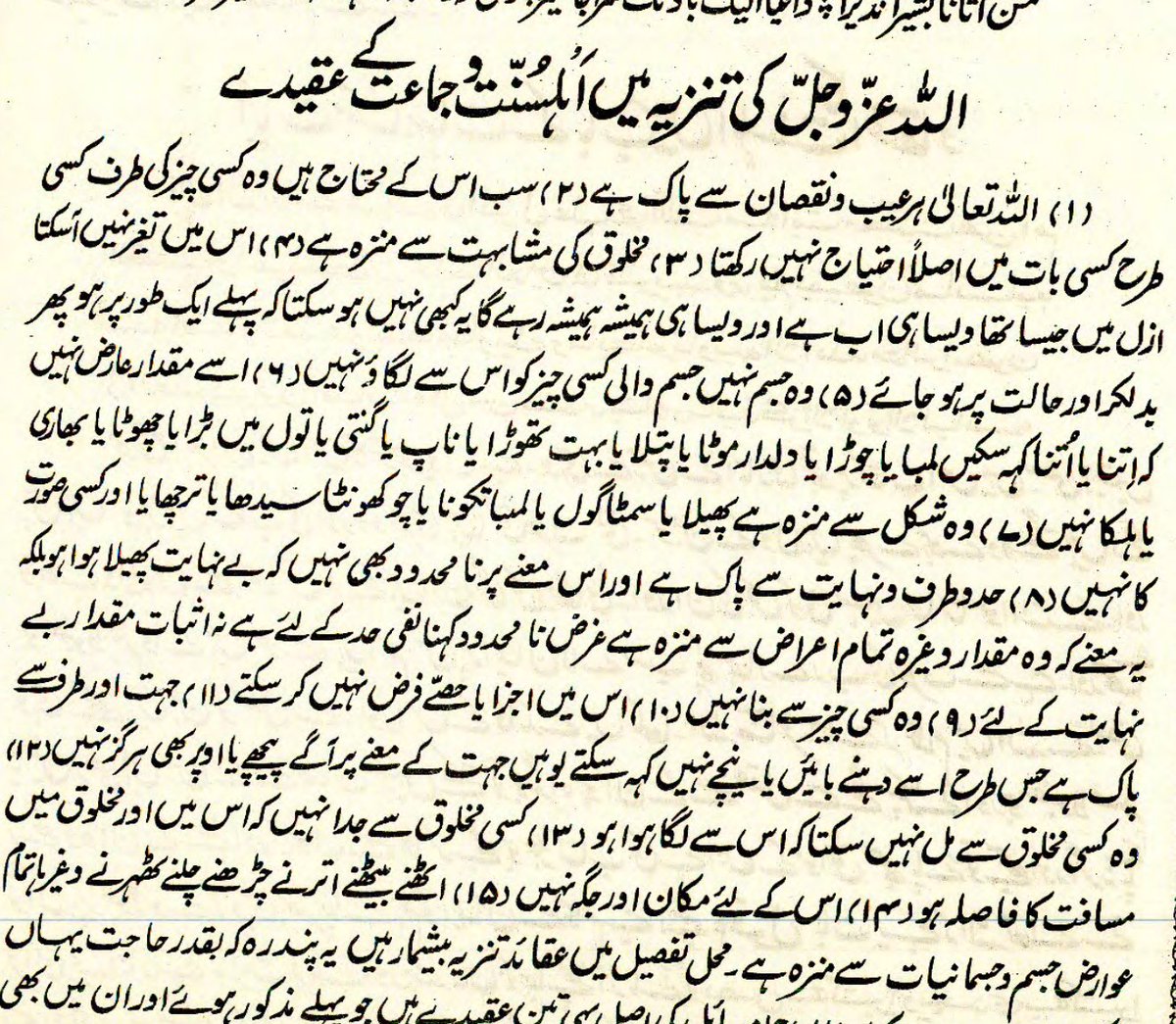
![After mentioning these 15 beliefs, he writes:❝In detail, there are countless beliefs relating to tanzīh [transcendence]. These 15 were mentioned here according to necessity, and besides these, the basis of all these matters are these 3 beliefs which were mentioned first, and After mentioning these 15 beliefs, he writes:❝In detail, there are countless beliefs relating to tanzīh [transcendence]. These 15 were mentioned here according to necessity, and besides these, the basis of all these matters are these 3 beliefs which were mentioned first, and](https://pbs.twimg.com/media/ErPIHY2XMAYe-4u.jpg)
![After mentioning these 15 beliefs, he writes:❝In detail, there are countless beliefs relating to tanzīh [transcendence]. These 15 were mentioned here according to necessity, and besides these, the basis of all these matters are these 3 beliefs which were mentioned first, and After mentioning these 15 beliefs, he writes:❝In detail, there are countless beliefs relating to tanzīh [transcendence]. These 15 were mentioned here according to necessity, and besides these, the basis of all these matters are these 3 beliefs which were mentioned first, and](https://pbs.twimg.com/media/ErPII-MXYAI2l5y.png)
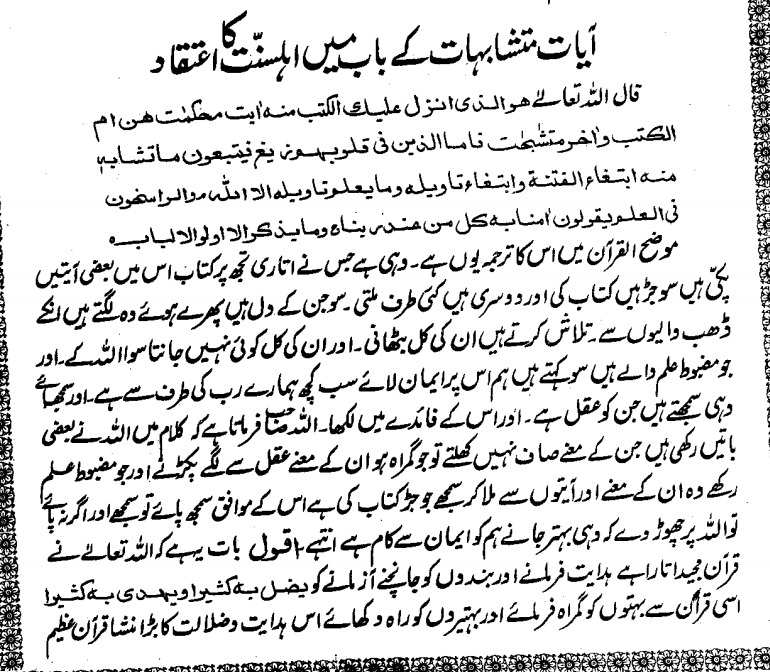
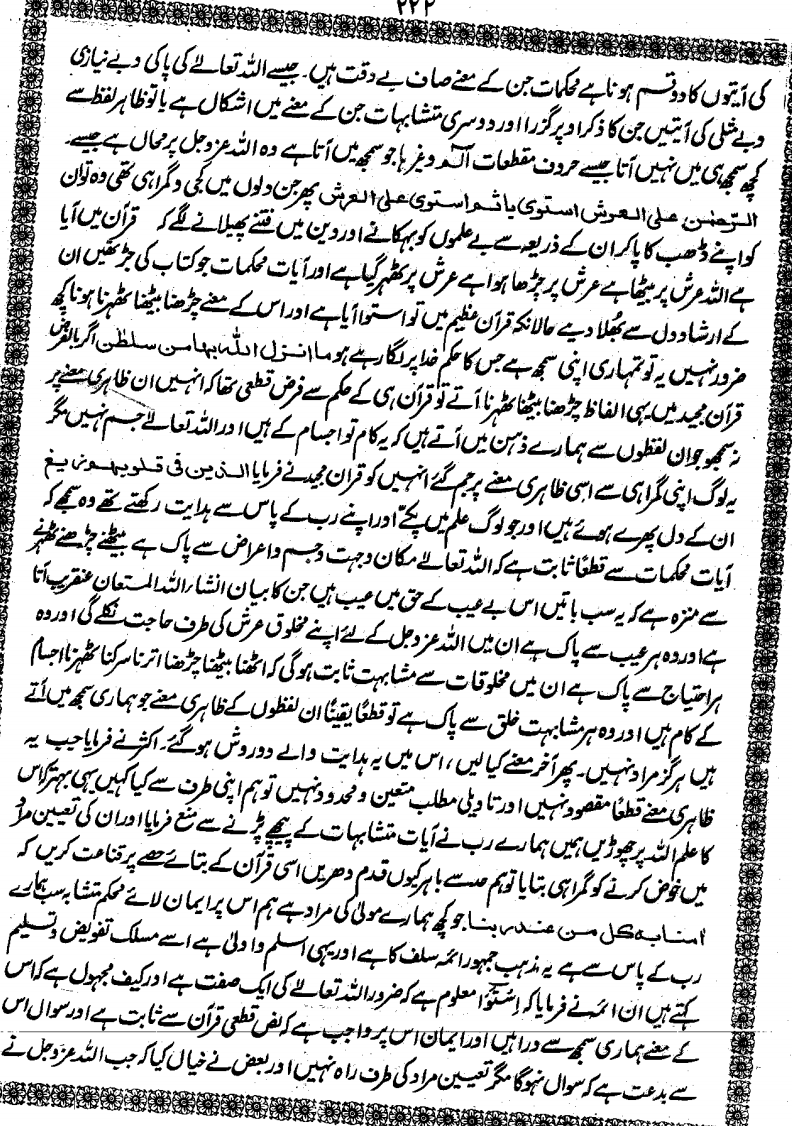
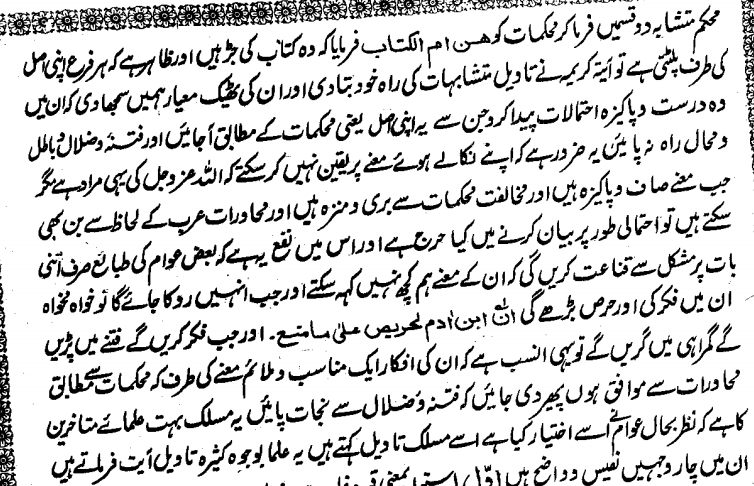
![These scholars did ta’wīl of this verse by many approaches, from these, four approaches are pure and clear:First, istiwā’a having the meaning of subjugation [qahr] and domination. This is proven from and exhibited in the Arabic language. The ársh is above and higher than all These scholars did ta’wīl of this verse by many approaches, from these, four approaches are pure and clear:First, istiwā’a having the meaning of subjugation [qahr] and domination. This is proven from and exhibited in the Arabic language. The ársh is above and higher than all](https://pbs.twimg.com/media/EstS0jlXIAMr-EN.png)
![These scholars did ta’wīl of this verse by many approaches, from these, four approaches are pure and clear:First, istiwā’a having the meaning of subjugation [qahr] and domination. This is proven from and exhibited in the Arabic language. The ársh is above and higher than all These scholars did ta’wīl of this verse by many approaches, from these, four approaches are pure and clear:First, istiwā’a having the meaning of subjugation [qahr] and domination. This is proven from and exhibited in the Arabic language. The ársh is above and higher than all](https://pbs.twimg.com/media/EstS2A_XYAIw9Rf.png)
